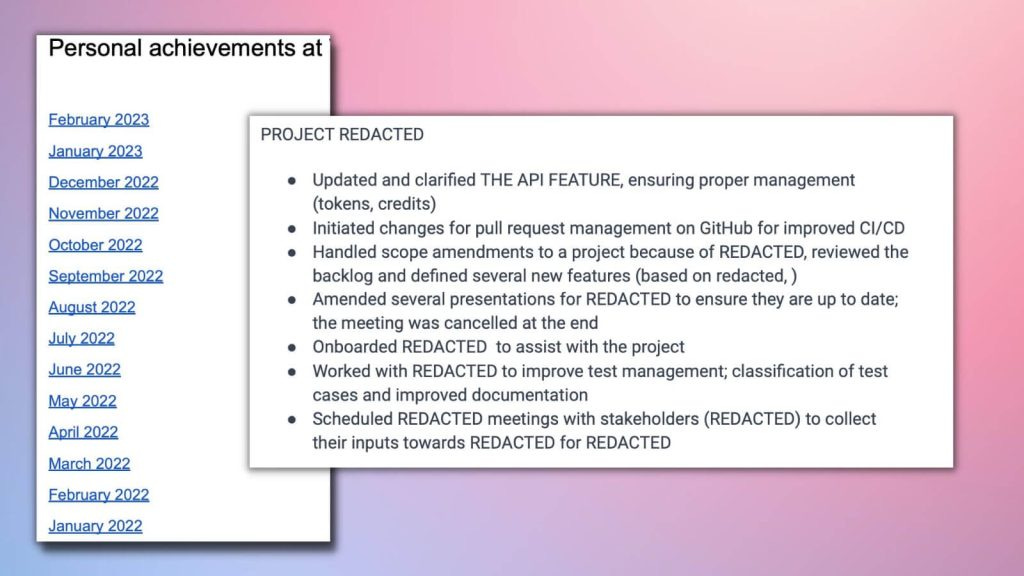Write it down now! Or why you should journal at work?
Benefits of journaling at work, or: How to ensure that you can nail the interviews, improve your performance reviews and self-reflect better?
First published at handpickedberlin.com
TL;DR: Write down your achievements at work. At least each month.
There are thousands of articles about the benefits of journaling. Writing things down in one way or another will help you park your thoughts from your brain on paper or in a notebook. Your thoughts, worries or problems will be clarified, and you will be able to find creative solutions and even reduce stress or anxiety.
Death on the hill of founders
I have journaled myself before. After a couple of months, I stopped journaling privately, but I still do it monthly at work. Here is why I think you should do it too:
I left Daimler after good seven years to work on my fantastic ideas (😅). I dreamt of a rosy future: a successful founder with appearances on podcasts I do not even listen to. This of course meant I would never ever need a CV again. A typical former corporate shirt thinking about winner-takes-all and blitz-scaling, huehue. How many have already died on this hill?
Fast forward roughly eight months and I admit it to myself, ok, let me have a look at my CV. I fired up Overleaf and worked on it for a couple of days. All that was missing was a good photo.
*click* Photo done. Ready for my job hunt.
STAR interview as a life-changing experience
I applied to several positions and had my life-changing revelation after interviewing for Amazon. They do their STAR method (Situation, Task, Action, Result) type of interviews, where you will be explaining the situations to 4-5 different interviewers. Because it helps to have different examples, you will need lots of them.
Say you pick eight leadership principles; it would be great to have at least twenty-four situations. Because you made it to the final round, you must have been great in your previous jobs and got a lot of sh*t done according to your CV. Time to prepare! It makes sense to make notes for each situation.
Easy. You open your notebook and look for your job journals. Empty. You never wrote things down. All those amazing problems you solved in 2016? Forgotten. How about the improvements in 2019? Sure…. what was that again? And the way you dealt with those idiots from the other department? Yeah, you get my point.
Most of it is a vague memory because this is how our brain works.
Writing things down: can it be so simple?
Now to prevent this situation from occurring read carefully: regularly write your achievements down. Make it at least a monthly habit.
Ok, for the unconvinced, here are more arguments:
"But I am not really looking for a job."
Today, next month, but do you know what will happen in two or five years?
"I memorize things well; I will remember the important stuff."
No, you won't. Plus, you will lose many details on the way.
"I will not need to interview again in my life."
Enjoy your pension, grandpa! For the rest of us: it will also help you with your annual/quarterly performance reviews or as a substance for self-reflection.
"But. I do not have any achievements."
This is a sad sight. But surviving on a job without achievements is also sort of an achievement, so you can maybe write your techniques down?
"I do not like writing things down."
Oh, dear. May whoever or whatever you believe in help you.
You get the point. Writing your achievements down (=work journaling) only has upsides. So start NOW.
"Ok. How should I do it?"
Now we are talking! I suggest keeping it simple. Here is my approach, but anything will work:
I write down a summary of each month at the beginning of the next one.
For additional inspiration, I look at my Trello/Jira boards or notes and glance over my calendar.
If I work on several projects, I use subchapters.
I try to write short bullet points supported by facts (eg. what did I do, or how I solved something)
Here is a real redacted example from February '23 on one of the projects:
I would have given you a free template, but the thing is so simple that you actually do not need one: just open a document and start.
Work journaling is a low effort and high impact life-changing thing. Start today or latest at the beginning of next month. It will help you with future interviews, current performance reviews and improve your self-reflection. 🥳
Like it if you liked it, comment if you have better ideas or suggestions. 🎉




